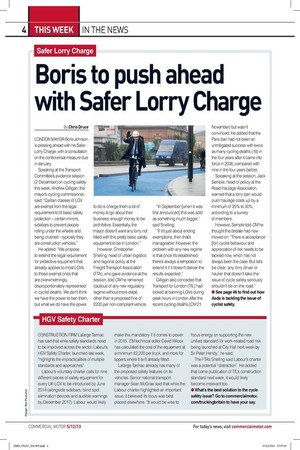Boris to push ahead with Safer Lorry Charge
Page 3

If you've noticed an error in this article please click here to report it so we can fix it.
By Chris Druce
LONDON MAYOR Boris Johnson is pressing ahead with his Safer Lorry Charge, with a consultation on the controversial measure due in January.
Speaking at the Transport Committee's evidence session (2 December) on cycling safety this week, Andrew Gilligan, the mayor's cycling commissioner, said: "Certain classes of LGV are exempt from the legal requirement to fit basic safety protection — certain mirrors, sidebars to prevent people rolling under the wheels and being crushed — typically they are construction vehicles." He added: "We propose to extend the legal requirement for protective equipment that already applies to most LGVs to those exempt ones that are overwhelmingly, disproportionately represented in cyclist deaths. We don't think we have the power to ban them, but what we do have the power
to do is charge them a lot of money to go about their business; enough money to be prohibitive. Essentially, the mayor doesn't want any lorry not fitted with this pretty basic safety equipment to be in London."
However, Christopher Snelling, head of urban logistics and regional policy at the Freight Transport Association (FTA), who gave evidence at the session, told CM he remained cautious of any new regulatory regime without more detail, other than a proposed fine of £200 per non-compliant vehicle.
"In September [when it was first announced] this was sold as something much bigger," said Snelling.
"If it's just about ending exemptions, then that's manageable. However, the problem with any new regime is that once it's established, there's always a temptation to extend it if it doesn't deliver the results expected." Gilligan also conceded that Transport for London (TfL) had looked at banning LGVs during peak hours in London after the recent cycling deaths (CM 21
November) but wasn't convinced. He added that the Paris ban had not been an unmitigated success with twice as many cycling deaths (18) in the four years after it came into force in 2006, compared with nine in the four years before.
Speaking at the session, Jack Semple, head of policy at the Road Haulage Association, warned that a lorry ban would push haulage costs up by a minimum of 25% to 30%, according to a survey of members.
However, Semple told CM he thought the debate had now moved on: "There is acceptance [for] cyclist behaviour and appreciation of risk needs to be tackled now, which has not always been the case. But let's be clear: any lorry driver or haulier that doesn't take the issue of cycle safety seriously shouldn't be on the road."
• See page 46 to find out how Asda is tackling the issue of cyclist safety.




































